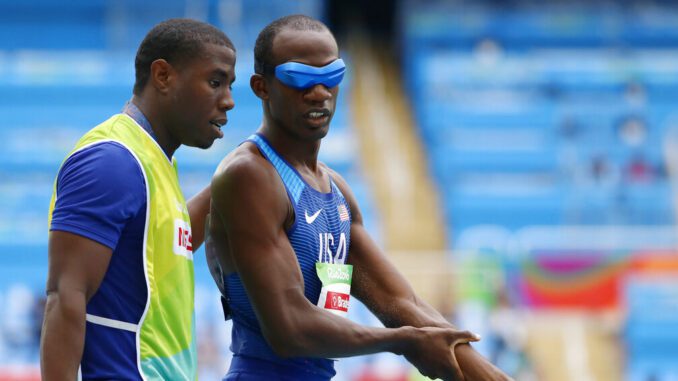
Lex Gillette lost his sight to a congenital defect at the age of 8. But that hasn’t stopped him from seeing possibilities others often overlook.
It’s a gift best described by the away message on his phone, in which he challenges the caller “to see more than what is in front of your eyes because that is where the true treasure lies.”
For Gillette, that treasure includes a trove of gold, silver and bronze — medals won in events at four Paralympics and numerous other world championship track and field events for athletes with disabilities.
The 36-year-old who was born in Kinston, grew up in Raleigh and earned a degree from East Carolina will try to add more precious metal to his stash on Friday when he competes in the long jump at the delayed 2020 Paralympics in Tokyo.
Regardless of the outcome, Gillette already considers himself a winner because of the inspiration his participation provides for other visually impaired individuals.
“I think you start to have a greater understanding of your impact and what’s going on out there,” he said. “You look at it as more than just a competition.
“I hear a lot from the blind and visually impaired community, but I also hear from athletes and people in general who are dealing with some sort of challenge. It’s definitely a ripple effect because somebody saw something within me and helped to expand my reach.”
That somebody in Gillette’s life was Brian Whitmer.
The basketball coach at Raleigh’s Athens Drive High School and a specialist in teaching the visually impaired, Whitmer was impressed by Gillette’s athletic ability during testing for the Presidential Physical Fitness Award.
The youngster was especially adept at the standing broad jump, an event in which his first attempt went over 10 feet — farther than anyone else in the class that day.
“I was like, ‘This is amazing,’” said Whitmer, who now works on the staff of Collegiate Prep Basketball Academy in Alpharetta, Georgia. “So after going through that class all year, I took him up to a sports camp in Kalamazoo, Michigan, through the United States Association of Blind Athletes and had him do a number of different events.”
One of them was the running long jump, an event Gillette was reluctant to try at first.
“My first thought was that this guy is kind of insane,” he said of the man asking him to sprint in a straight line down a 130-foot runway and catapult himself as far as he could into a sandpit he couldn’t see. “Imagine yourself running as fast as you can toward a sound, not knowing if you’re going to run into anything or trip over something. But I decided to take a shot and see what happened.”
When he got back home to Raleigh, Whitmer talked the track coach at Athens Drive into letting Gillette compete for the school’s varsity team. Building on the energy and determination he inherited from his mother, who is also blind, his career took off from there.
As it turned out, he was a natural jumper — a fact Verdina Simms learned shortly after her son lost his sight.
“Elexis had this thing about climbing and jumping off of things, not knowing that those little footsteps, those little jumps were preparation for where he is today,” she said. “He’s a boy. They’re going to get bumps and bruises regardless, so I treated him just like he had sight.
“I put him up there and he started walking the wall. He fell down, I picked him up and put him right back up there. I tell you what, it has been an awesome and extraordinary journey, and I am so proud of what he’s accomplished.”
Because Gillette is unable to see the takeoff board, a guide positions himself at the end of the runway shouting “fly, fly, fly” to his athlete to let him know when to jump.
At the Paralympics, blind competitors are given a larger takeoff area than sighted athletes. The box is coated with a powdery substance that allows their jumps to be measured accurately from the footprint of where they leave the ground.
Gillette is a three-time world champion who has previously held the world record for the blind long jump and is currently the American record holder at 22 feet, 2 inches. He is also a motivational speaker whose motto is: “There’s no need for sight when you have a vision.”
“He’s amazing,” Whitmer said. “Last year when everything was virtual and he couldn’t come visit, he got on Teams meetings with my classes and went through lessons.
“That’s very inspirational to these kids. The kids I work with have disabilities and they need to see that he’s finding a way to overcome his. He does a really good job of communicating that with kids.”
As important as that aspect of his career might be, Gillette is still a competitor. And because he has won silver in all four of his previous Paralympic appearances, he is highly motivated to bring home his first gold from Tokyo in what is likely to be his last opportunity.
“That’s the goal,” he said. “Make no mistake about it, I’m certainly going in to win.”


